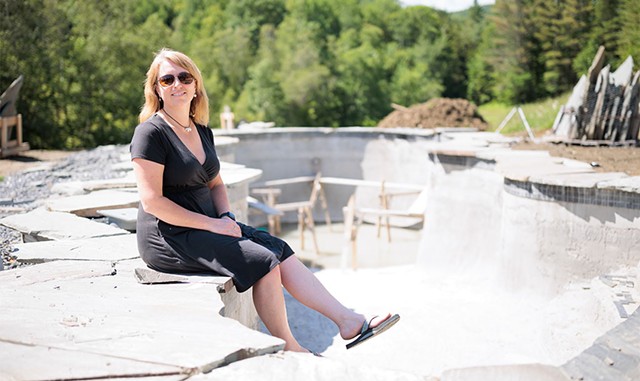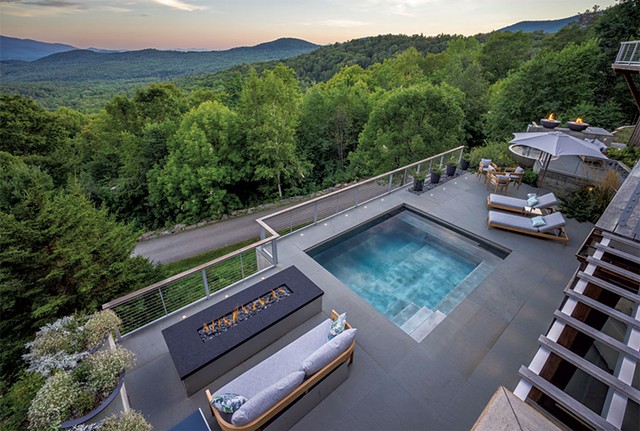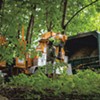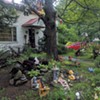click to enlarge 
- Ben Deflorio
- Denise Rundle of Northeast Pools & Spas in Sharon
Vermont has a lot more backyard ponds than swimming pools. Or so it looked to surveyor Jack Milbank on a pre-pandemic glider ride over the town of Stowe.
That appears to be changing. In the past two and a half years, more splashes of blue — in some cases, classic aqua — have been added to the Green Mountain State landscape. Milbank has worked on five pool projects, which for him, he said, is "a lot." Nationally, pool builders have been flooded with orders — a trend that's in line with the overall home improvement surge that started in 2020.
Denise Rundle, a co-owner of Northeast Pools & Spas in Sharon, laughed when asked if she's going on vacation this summer. Rundle's company will install 10 high-end swimming pools during Vermont's few short months of warm weather, and, with 30 clients on her waiting list, she's never been busier.
Rundle's pools cost between $65,000 and $250,000, and the company is booked out until 2024. Rundle said inquiries have tripled since before the pandemic — mostly from "the people moving from the cities."
Real estate agent Averill Cook noted the same thing while showing a $2.5 million home in Shelburne. "One of the common questions that came up was: 'Can you put a pool in?'" he said of the recent listing. After enough potential buyers asked, he called Milbank at Civil Engineering Associates in South Burlington to get an answer.
"They're all considered structures," Milbank said of backyard pools, noting the array of permitting rules that may restrict their construction in Vermont. Shelburne has lakeshore setback requirements. A variety of state environmental permits may apply, too, depending on the surrounding patios and other features. Some towns — including South Burlington — have their own permitting requirements. In some communities, even lower-cost, aboveground pools need a permit if any kind of deck is involved.
In the case of the Shelburne house, however, Cook assured the potential buyers that, yes, a pool was possible.
He also leveled with them: "There is, I believe, the last time I checked, a two-year wait list on pools these days."
A survey in April of the nation's top pool and spa builders found that 20 percent have at least a yearlong backlog of orders. Forty percent told the industry website Pool and Spa News that their revenue had increased by one-fifth in the last year.
Residential swimming pools — indoors and out — come in all shapes, sizes and even colors. The kidney shape was big for decades, starting in the ’50s. Pool designers and builders say rectangles are popular in Vermont at the moment. Rundle said that’s because they pair well with an automatic cover.
"The typical thing I do is a rectangle with an automatic safety cover, because it retains heat in this cold region," she said.
Rundle added that most people ask for a built-in heater and a dark finish on the bottom. "It looks more natural in this environment. They don't want that bright aqua."
click to enlarge 
- Courtesy Of Knauf Landscape Architecture
- Stainless plunge pool designed by Cynthia Knauf of Knauf Landscape Architecture
Landscape designer Cynthia Knauf, who has an office in Colchester, has created several infinity pools over the 30 years she's been in business. The pools are often part of a larger plan.
"I always prefer to fit the pool into the natural conditions," said Knauf, who does a lot of her work in resort areas such as Stowe. "It's part of a bigger outdoor space. There are usually terraces, gardens and paths, and it needs to have a nice connection to the house."
There's almost no limit to what you can add to a pool, such as fountains, grottoes and waterfalls. Some high-end pools are made to look like natural landscape features, with real or artificial rock instead of tile. But Knauf said she designs most of her pools to fit in more naturally with the shape of the home.
"Mimicking the lines of the house is one way to connect it to the house," she said. "And then you can soften it with your plants."
Rundle avoids rocks, because they tend to move during the freeze-and-thaw cycle.
"I personally am not willing to take the risk of a grotto crashing down because frost heaves the stones," she said. She thinks Vermont's landscape is so appealing and varied that customers don't need to add a lot of decorative elements.
"Many of those places in Texas, Tennessee and Florida, where they have a lot of swimming pools with grottoes and stones, those are flat areas," Rundle said. "They're trying to create some privacy screens. Here, we already have beautiful things to look at; we don't need to create a rock mountain in our backyard."
Rundle, who also works in New York and New Hampshire, said the latter requires more inspections during construction than Vermont does. It also has more state rules regarding pool fencing, which Vermont leaves up to municipalities.
"We recommend everyone have a fence or safety cover no matter where they live," Rundle said. "Many insurance companies require it even if the municipality does not."
Another must is regular cleaning and sanitation. Chlorine is still the go-to chemical, although Rundle said she hears a lot of requests for alternatives. She said using a pool cover can help lessen chlorine use by minimizing the pool's exposure to UV rays. She discourages customers from installing saltwater pools because salt is corrosive, especially when added to chlorine.
"Salt doesn't have any sanitizing properties whatsoever," Rundle added.
The labor shortage is limiting pool construction and maintenance. An increase in material prices is making it difficult to estimate costs in the future. Earlier this year Rundle sold off the service department at Northeast Pools & Spas, which she co-owns with her brother and father.
"I had just lost a longtime employee, and I would have to leave my job of running the company to go clean pools just to keep up," Rundle said. "My brother was doing the same thing; he'd have to leave construction to clean pools. You can't skip a week or you'll have algae."



















































